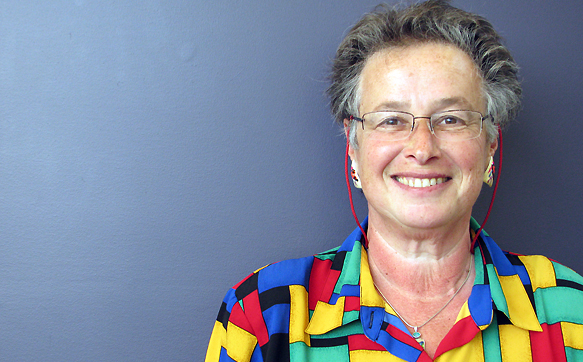Hedy Moscovici, professor of education, died on Nov. 4 following a long struggle with cancer; she was 56 years old. Deeply committed to fostering diversity and excellence in the teaching profession, she focused her research on the teaching of math and science in elementary, secondary and college levels. Earlier this year, she was recognized for her contributions to the profession as a Fellow of the American Association for the Advancement of Science at the organization’s annual meeting in Washington D.C.

“Hedy was an enthusiastic and skilled teacher, and was passionate about making science real for high school teachers,” says Anupama Joshi, acting dean of the College of Professional Studies. “She was deeply concerned about the lack of science materials and lab space in schools, and was instrumental in creating an instructional lab here on campus in the South Academic Complex so that our candidates could experience hands-on science during their preparation program.”
Irene Osisioma, associate professor of teacher education, was one of only two science educators with Moscovici in the School of Education. She says that her colleague was a great influence on her teaching and research.
“Hedy was an excellent mentor… and played a huge role in my career growth,” she says. “She served as an adviser to all she encountered and inspired me to believe that I, with no experience teaching in the university system, could actually become a success doing so. She was an avid researcher who made data collection a part of her life. She often advised me to carry a note pad and pen with me all the time, because perhaps, I may see or remember something that might constitute data to include in my research.”
Glenn Masuda, a consultant in information technology, met Moscovici when he was a technician for the now School of Education. He says that her energy and drive were “contagious.”
“You always knew when Hedy was in the building, with a book carrier filled with science kits and a head full of ideas,” he recalls. “After I would talk to her, I would be ready to go–no coffee necessary.”
Joshi echoes his sentiments and says that Moscovici “always made time to talk… laughed easily, and wasn’t afraid to speak what needed to be said.”
Osisioma says that Moscovici believed that students should be empowered with an active part in the learning process in and out of the classroom.
“Hedy believed that learning was a change in behavior and that we as educators should help our students experience this change in behaviors in such a way that they ‘grow through life’ as they ‘go through life,’” says Osisioma. She before her students on a day-to-day basis to inquire, observe, facilitate, and, most of all, inspire them to achieve success.”
Moscovici, a native of Bucharest, Romania, began her career at California State University, Dominguez Hills in 1998 as an assistant professor in secondary science methods. Prior to her arrival on campus, she was a science education consultant and professor at Western Washington University. She earned her Master of Science in microbiology at Hebrew University in Jerusalem and her doctorate in science education Florida State University. Last year, she was honored by FSU with the Distinguished Educator Alumni Award by its College of Education.
Moscovici authored and served as primary investigator for numerous grants in the School of Education and was lead member of the science team in the Quality Educator Grant (QED) at CSU Dominguez Hills. She worked on the immersion task force for the System-wide Change for All Learners and Educators (SCALE) grant supported by the National Science Foundation (NSF); and was primary investigator for a supplemental science grant under the Los Angeles Urban Systemic Program. Moscovici served on the editorial boards of the Journal of Research in Science Teaching and the teacher education section of Science Education. She was a board member of the Association for Science Teacher Education and the Centers for Ocean Science Education Excellence COSEE-West.
Dr. Moscovici is survived by her husband, Uri Moscovici, and three sons, Danny, Tal and Ido. She was a resident of Rancho Palos Verdes.
The School of Education is planning a remembrance for Moscovici; date and location to be announced. In addition, her colleagues will dedicate a bench on campus at the University Pool to honor Moscovici’s memory and her love of swimming. For information on how to donate, contact the Office of Development at (310) 243-2182.